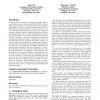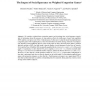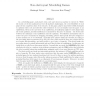27 search results - page 3 / 6 » The Price of Anarchy for Polynomial Social Cost |
STOC
2002
ACM
14 years 6 months ago
2002
ACM
We study the degradation in network performance caused by the selfish behavior of noncooperative network users. We consider a model of selfish routing in which the latency experie...
ATAL
2008
Springer
13 years 7 months ago
2008
Springer
In this paper, we investigate multi-agent learning (MAL) in a multi-agent resource selection problem (MARS) in which a large group of agents are competing for common resources. Si...
WINE
2009
Springer
14 years 12 days ago
2009
Springer
We consider weighted linear congestion games, and investigate how social ignorance, namely lack of information about the presence of some players, affects the inefficiency of pure...
NETWORKING
2008
13 years 7 months ago
2008
We study distributed content replication networks formed voluntarily by selfish autonomous users, seeking access to information objects that originate from distant servers. Each us...
SAGT
2009
Springer
14 years 10 days ago
2009
Springer
In a scheduling game, each player owns a job and chooses a machine to execute it. While the social cost is the maximal load over all machines (makespan), the cost (disutility) of ...



